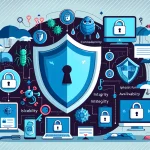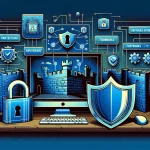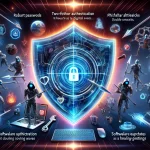
Estimated reading time: 8 minutes
Key Takeaways
- Understanding Cybersecurity: It's essential to protect your digital assets from cyber threats.
- Core Tools: Utilize firewalls, antivirus software, and password managers to enhance security.
- Common Threats: Be aware of malware, phishing, and ransomware attacks.
- Safe Practices: Implement safe browsing habits and protect personal information.
- Stay Informed: Regularly update your knowledge on cybersecurity trends and threats.
Table of Contents
What is Cybersecurity?
Cybersecurity encompasses the methods and technologies that protect computers, networks, and data from digital attacks. As our lives become increasingly digital, protecting our information from cybercriminals has never been more important.
Think of cybersecurity like the locks, alarms, and security cameras that protect your home – but for your digital assets. Without proper protection, your personal information, financial data, and private communications remain vulnerable to theft or misuse.
Essential Cybersecurity Building Blocks
Core Security Tools
- Firewalls: These act as security guards for your network, monitoring incoming and outgoing traffic to block suspicious activity.
- Antivirus Software: This protection scans for and removes malicious programs that could harm your device or steal your data. Learn more
- Encryption: This technology scrambles your information so only authorized recipients can read it. Discover more
- Password Managers: These tools create and store strong, unique passwords for all your accounts. Find out how
Common Cyber Threats to Watch For
- Malware: Harmful software that includes viruses, worms, and spyware designed to damage or take control of your devices.
- Phishing: Fraudulent messages that trick you into revealing sensitive information or downloading malware. Read more
- Ransomware: Malicious programs that lock your files and demand payment for their release.
- Social Engineering: Psychological manipulation tactics used to deceive people into sharing confidential information.
Smart Internet Security Practices
Safe Browsing Habits
Before clicking links or downloading files, verify the website's security by looking for:
- The padlock icon in your browser's address bar
- “https://” at the start of the web address
- Correct spelling of familiar website names
Protecting Your Personal Information
Take control of your online presence:
- Review and adjust social media privacy settings regularly
- Limit the personal details you share online
- Use different email addresses for different purposes (personal, shopping, newsletters)
Public Wi-Fi Safety
When using public networks:
- Avoid accessing sensitive accounts or making financial transactions
- Use a VPN to encrypt your connection
- Disable automatic Wi-Fi connections on your devices Learn how
Creating Your Personal Security Plan
Follow these steps to build a strong security foundation:
- Make an inventory of all your devices and online accounts
- Update all software and operating systems
- Enable multi-factor authentication wherever possible
- Create secure backups of important files
- Set up regular security maintenance schedules
Essential Security Tools
Start with these fundamental protection tools:
- Password Managers: LastPass, Bitwarden, or 1Password Explore options
- VPN Services: For encrypted internet connections
- Backup Solutions: External drives or cloud storage services
- Security Software: Comprehensive antivirus and anti-malware protection Find out more
Staying Informed and Protected
Cybersecurity threats evolve constantly. Stay protected by:
- Following reputable cybersecurity news sources
- Subscribing to security alerts from your device manufacturers
- Regularly reviewing your security measures
- Learning about new threats and protection methods
Remember: Good cybersecurity isn't about having perfect protection – it's about making yourself a harder target through consistent, smart practices. Start with these basics and build your knowledge over time.
Frequently Asked Questions
What is cybersecurity?
Cybersecurity refers to the practices and technologies designed to protect computers, networks, and data from unauthorized access, attacks, or damage.
Why is cybersecurity important?
With the increasing reliance on digital platforms, cybersecurity is crucial for protecting sensitive information and maintaining privacy.
What are common cybersecurity threats?
Common threats include malware, phishing, ransomware, and social engineering attacks.
How can I protect my personal information online?
You can protect your information by using strong passwords, enabling two-factor authentication, and being cautious about the information you share online.
What should I do if I suspect a cyber attack?
If you suspect a cyber attack, disconnect from the internet, run a security scan, and report the incident to your service provider or local authorities.









